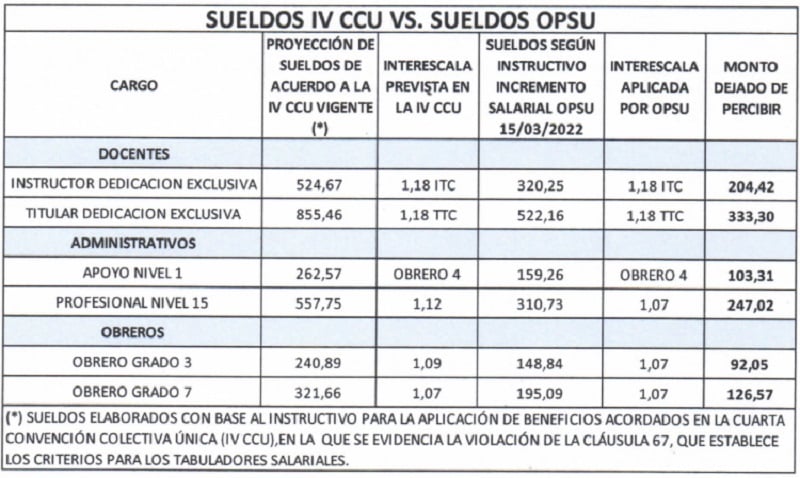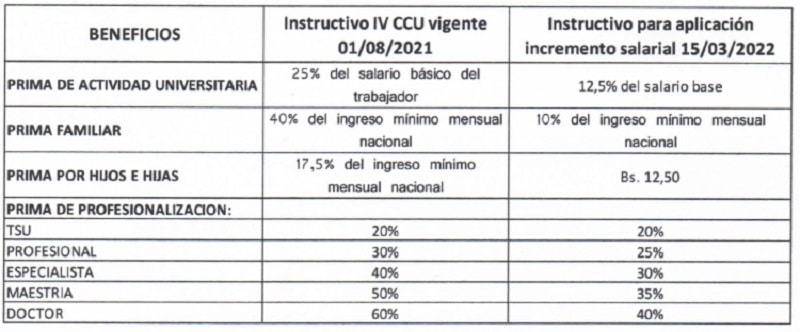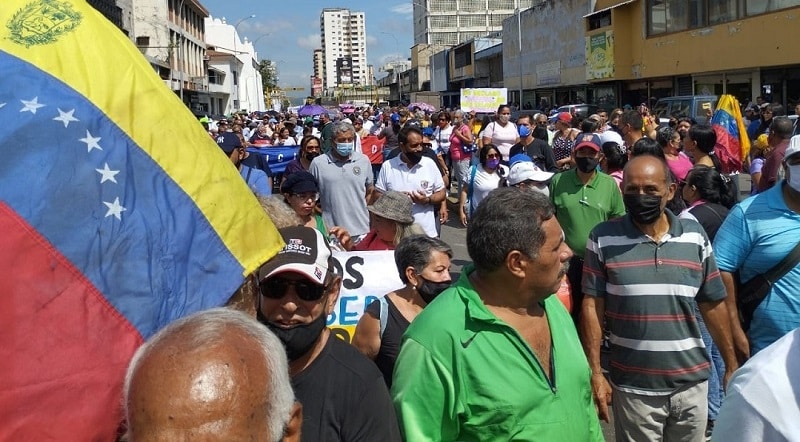
Venezuela's Supreme Court of Justice headquarters in Caracas. File photo.

Orinoco Tribune – News and opinion pieces about Venezuela and beyond
From Venezuela and made by Venezuelan Chavistas

Venezuela's Supreme Court of Justice headquarters in Caracas. File photo.
A diversity of voices demand greater clarity about the “ONAPRE instructions.”
The substantial, expected, necessary and celebrated salary increase of March was followed, as appropriate, by the adaptation process according to collective agreements, tables, tabulators, rankings and scales of the different institutions, entities and agencies of the national public administration.
Through the Special Official Gazette No. 6,691 of March 15, 2022, the two presidential decrees that increased the mandatory monthly minimum wage, as well as the amounts of retirement benefits, pensions and the socialist basket ticket, were approved by the National Assembly.
For the application and execution of these resources, the National Budget Office (ONAPRE), which is under the Ministry of Economy and Finance, has the power to “analyze the budget projects that must be submitted for its consideration and, when appropriate, propose the corrections it deems necessary” as detailed in No. 5 of the “attributions” section on the office’s website.
The mechanism containing the criteria for the application of the last salary increase, officially called “Adjustment Process of the Public Administration Remuneration System, Collective Agreements, Special Tables and Strategic Companies,” is better known as the “ONAPRE instructions.” Today it is at the center of a national controversy involving workers, unions, employers, deputies and different political factions, which is beginning to take on a worrying aspect.
After the execution of these instructions was made public, where there is a verifiable reduction in the percentages of the different bonuses that are part of the salary, various union sectors began to denounce an alleged attack against historical labor claims, the Organic Labor Law, and ultimately, the Constitution. Unions point out that these rights, defined according to type of personnel, grade and level, are being violated by the ONAPRE that is ignoring the constitutional and labor principles of intangibility and progressiveness.

The health and education sectors, that constitute the largest payrolls in the state, were the main victims. In particular, teachers who are receiving installments of a deferred vacation bonus, highlight that the bonus calculation is based on the old salary and not the updated one. The controversy surrounding this vacation bonus has heated up the conflict in recent days.

Highly specialized university professors were the most affected due to this.
ONAPRE reduced bonuses silently, without explaining why
The renowned communicator and Chavista influencer on social media, Luigino Bracci Roa warned about this. “The percentages of the different bonuses [premiums] that are part of the salary [for professionals, specialists, for master’s degree holders, for seniority] were reduced, and it was done silently, without explaining why, if it is something temporary, or without trying to give any kind of explanation,” said Bracci, who is also a public sector employee and works as a journalist for Alba Ciudad.
“There is no more information, nobody [from ONAPRE] is saying anything publicly,” he wrote in an article titled “ONAPRE, workers’ protests, and luxury cars of public officials,” published on his blog El Espacio de Lubrio. “The reasons are not explained. The subject is not discussed in the public media. No one asks about it at press conferences… this causes dissatisfaction among the workers whose benefits are eliminated and they are not told why. It is as if you are being ignored, as if your problems don’t matter.”
Bracci emphasized that the “patient explanations that the ministers may have given to the trade unionists in negotiations do not go downstream to the workers,” and stressed that the lack of official communication of these measures “leads to rumors and a lot of discontent.”
RELATED CONTENT: Venezuela: Labor Protests and Narco-Politics Are Warning Lights on the Dashboard
Protests, marches, and an annulment claim in the Supreme Court
Since April, a series of mobilizations started, and agitation began to be voiced in social media, organized by some of the affected unions, demanding the repeal of the ONAPRE instructions.
As the disruptive element of the payment of the vacation bonus in installments was introduced, the education sector began to explode in protests in the current month, with mobilizations in at least 14 states of the country, some of them with thousands of marchers.

On June 2, five universities filed before the Supreme Court of Justice (TSJ) a petition for annulment of the ONAPRE instructions, together with a precautionary injunction against the ONAPRE mechanism.
The plaintiffs are rectors and lawyers from the Central University of Venezuela (UCV), Carabobo University (UC), Antonio José de Sucre National Experimental Polytechnic University (UNEXPO), Libertador National Experimental Pedagogical University (UPEL) and University of the Andes (ULA). Subsequently, the Workers’ Savings Bank of the University of Carabobo and the Workers’ Union of that university joined the nullity claim.
They emphasize that the adjustment of salary scales “is in violation of the principle of progressiveness of human rights, by transgressing the guarantees of intangibility and inalienability of labor rights and benefits.” They also demand that this is incompatible with the wage increase decreed on March 15 “which has also been violated.”
The Supreme Court admitted the petition against the ONAPRE mechanism in mid-July. The Political-Administrative Chamber of the Court, in judgment No. 00252 drafted by Judge Malaquías Gil Rodríguez, announced the “provisional admission of this claim for annulment as far as the law is concerned,” but did not proceed with the precautionary injunction that could have left the “ONAPRE instructions” temporarily without effect.
The ruling by the TSJ, then, opens the possibility of a substantive response that could annul or confirm the mechanism used to set the salaries of public employees.
Chavismo takes the street
The Bolivarian Socialist Union of Workers (CBST) took the streets of Caracas on August 10 and 11 on the premises of defending the Organic Labor Law, in support of the economic and salary recovery program, for the social stability of the country and in support of the Bolivarian Revolution.
#EnFotos 📸🇻🇪
Ni el palo de agua pudo detener la gran movilización de nuestro pueblo trabajador que este miércoles #10Ago tomó las calles de #Caracas en Respaldo a la Revolución y al Programa de Recuperación Económica y Salarial.#TrabajadoresConLaPatria #GranMarchaSocialista pic.twitter.com/B3KZMBFnLG
— SOMOS FUTPV (@SoyFutpv) August 10, 2022
The president of the CBST, Deputy Wills Rangel, said in a statement published in the Unidad Obrera bulletin, that the Venezuelan working class has been the greatest defender of legal norms in labor matters “ensuring that they do not run the risk of becoming dead letter.”
“We are concerned, and even more alarmed, by the answers that are given from different entities to problems already defined by the Organic Labor Law… without resorting to further explanations and ignoring the pedagogy supported by our beloved Commander Chávez of convincing without imposing,” states the bulletin.
Rangel reiterated the consistent will of the Chavista union to defend and accompany President Nicolás Maduro until the end. “We have been fulfilling this with passion, but also with intelligence to prevent the political blindness of an infamous minority that proudly exhibits its bureaucracy and corruption, from succeeding in immolating on the altar of indolence an entire generation of committed leaders who today are disconcerted by some decisions without consultation and some dogmatic instructions,” he said.
Comunicado a toda la Clase Obrera Venezolana desde el seno de la @cbolivariana Seguimos en batalla por la consolidación de la Patria Socialista junto a nuestro hermano de clase el Presidente Obrero Nicolás Maduro Moros @NicolasMaduro@delcyrodriguezv@PartidoPSUV@Asamblea_Ven pic.twitter.com/T05rpHsqyH
— Wills Rangel PDVSA CBST FUTPV (@WillsRangelCBST) August 10, 2022
He also referred to a “mercenary and paid union leadership” that strives to fan the flames of discontent by taking advantage of the confusion generated by an “unfortunate instruction not efficiently explained to the nation.”
He announced the CBST’s willingness to participate in a Social Dialogue Table and added that the professional talent of the union cadres is available to “trace routes, configure models and carry out financial calculations that contribute to providing answers and cleaning up procedures.” He further stated that the union will co-sign a list of petitions to the Ministry of the Social Work Process.
#EnVideo📹| Ministro para el Proceso Social de Trabajo, @torrealbaf: "Nuestro presidente obrero defenderá y dará máxima garantía de respeto a cada convención colectiva vigente, y legitimidad a cada artículo de la Ley de los Trabajadores y Trabajadoras".#VenezuelaEnDesarrollo pic.twitter.com/mOySEj5qe8
— VTV CANAL 8 (@VTVcanal8) August 11, 2022
Workers should not fall into the trap of manipulation
The president of the Permanent Commission of Economy, Finance and National Development, Deputy Jesús Faría, expressed that the workers of the country “should not fall into the trap of manipulation and demagoguery that are mixed with this call for protests.” He stressed that the government is trying to guarantee better income in complex conditions and that “a technical office does not decide the salary of Venezuelans.”
“Economic growth is propelling substantial improvements in the quality of life of Venezuelans and of salaries in particular. We are not satisfied yet, we have not yet reached where we should be,” said the parliamentarian during a press conference in the Federal Legislative Palace.
Later, in an interview with journalist Vladimir Villegas for the podcast 10 minutos con Vladimir, Faría said about to the anti-ONAPRE marches, “They are very small protests that we do not downplay, but an escalation of protest against the government of Nicolás Maduro, that is not happening.”
He insisted that the majority of the Venezuelan working class supports the Bolivarian Revolution and that despite the economic blockade, President Maduro is recovering workers’ salaries.
“The only one who is responsible for the deterioration of the salary situation in Venezuela is the United States government, together with the far-right forces of the Venezuelan opposition,” he pointed out.
Debate in the National Assembly
An interesting exchange took place in the regular session of the National Assembly on August 4, where deputies Bruno Gallo, Pedro Carreño, José Brito and National Assembly President Jorge Rodríguez debated the issue. Below is the transcript of part of that discussion.
Bruno Gallo (Avanzada Progresista):
“Venezuelan workers have been on the streets several times in recent weeks, defending their rights to a dignified life and a decent salary. All this Assembly should support them. Those of us who, for many years, on both sides, have defended the progressive rights of the proletariat, cannot leave the workers alone.
“The ONAPRE instructions is openly regressive and violates the workers’ right to progressivity of achievements. The vacation bonus, which is being paid in installments, is being used to cover the vital needs of teachers. All of us who know university professors know about the precariousness in which they are living their lives.
“We can understand the financial difficulties that the government is going through; what is incomprehensible is that these measures are being taken without sufficiently informing the society.
“It is up to this Assembly to generate consensus, a space for dialogue and negotiation to resolve the conflict in the best way.”
Pedro Carreño (PSUV):
“The reactionary right is following its destabilization plan and it is its job not to lose [an opportunity] to try to disturb thepolitical and social stability of the nation.
“Anyone who listens to this deputy [Bruno Gallo], and to all those who are making a chorus in the street on behalf of the real needs of Venezuelan workers, in an exercise of rationality, would understand that this proposal is consistent as long as they themselves have raised their voices to oppose with that vehemence the blockade on our Homeland.
“One of the fundamental reasons for this perverse action of imperialism was to have a substantial impact on one of the most important achievements of this Revolution, which is the welfare state of our people.
“It disrupted the economy, where the State receives 1 where it should have received 100.
“Within the sphere of its powers, ONAPRE fulfills the role of planning the budget based on national income and its redistribution. That instruction that is being demonized and subjected to public ridicule, became a kind of retaining wall to curb the claims of the right that is trying to show that the government is lazy, when what the instruction actually says is that there are no resources, nor is there a means to solve the needs.
“Therefore, there lies not only a great self-righteousness, but a destabilization plan that is not against ONAPRE or the instruction, it is against President Nicolás Maduro, the Homeland and the Revolution.
“The Bloc of the Homeland does not lend itself to these perverse games. We will defend the hope, the institutions and the rights of the working class, but depending on the recovery of the economy and the directionality of that income to satisfy the most felt needs.”
José Brito (Primero Venezuela):
“We have categorically rejected sanctions, coercive measures and blockades against the country. But the workers’ claims cannot be qualified as a destabilizing act.
“When you see the faces of those on the street, there are no people promoting blockades or sanctions. I see the faces of people who are even members of the majority party in this assembly but who today see their rights violated.
“The progressivity of rights cannot be replaced by the regressive nature of these instructions.”
Jorge Rodríguez (PSUV):
“While the widows of the sanctions and the blockade are giving their speech, at this very moment the Minister of University Education is meeting with the unions, discussing the terms of the instructions.
“President Nicolás Maduro is the co-author, together with Comandante Chávez, of the most progressive Labor Law that the history of this continent has known.
“Let us ask ourselves what the solution is, beyond rhetoric and demagoguery, and who is going to implement it. Let us ask ourselves how it is that in the midst of the brutal blockade, Venezuela and Bolivia are the only economies in the continent that are growing.”
(CiudadCCS) by Matías Aberg Cobo
Translation: Orinoco Tribune
OT/EF/SC
You must be logged in to post a comment.